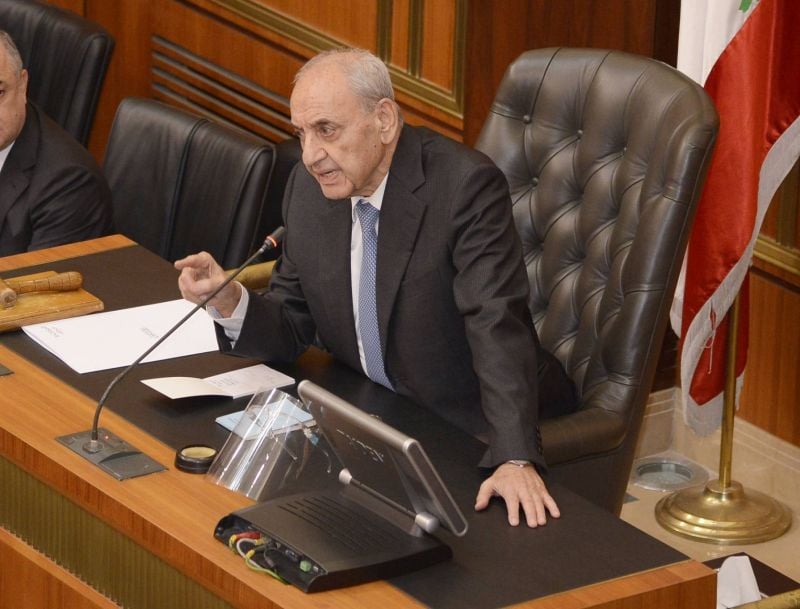
Parliament Speaker Nabih Berri during a presidential election session on Dec. 1st. (Credit: Ali Fawaz/Lebanese Parliament)
Want to get the Morning Brief by email? Click here to sign up.
Parliament Speaker Nabih Berri scheduled an 11th Parliament session dedicated to electing a new Lebanese president. The meeting will take place on Thursday. Parliament has repeatedly failed to name a successor to Michel Aoun since the start of the presidential election period two months before the end of his term on Oct. 31. Lebanese Forces head Samir Geagea ahead of Thursday’s vote expressed willingness to meet with Free Patriotic Movement leader Gebran Bassil. While the LF has consistently backed Zgharta MP Michel Moawad’s candidacy, the Free Patriotic Movement, along with Hezbollah and their allies have repeatedly cast blank votes. The presidential vacuum is coupled with the absence of a fully empowered government, hampering Lebanon’s ability to enact key decisions, such as the approval of financing for fuel imports to power the state’s power plants.
Dozens of the Aug. 4, 2020, Beirut port blast victims’ relatives protested yesterday at the Beirut Justice Palace to oppose the halting of the investigation into the tragedy. Scuffles broke out between protesters and security forces. Forces of Change MP Halimé El Kaakour criticized Finance Minister Youssef Khalil for not approving judicial assignments allowing the investigation to resume. The lead investigator in the probe, Judge Tarek Bitar, is unable to proceed with the investigation until rulings are issued on complaints filed against him by political figures he called for questioning. Meanwhile, the rulings are further stalled by complaints filed by the same parties against the judges designated to rule on the complaints against Bitar resulting in a deadlock that cannot be resolved until a quorum is restored to the Plenary Assembly of the Court of Cassation. The port explosion on Aug. 4, 2020, killed more than 220 people and injured 6,500 others, destroying nearby neighborhoods.
Two separate armed incidents at banks in southern Lebanon occurred yesterday, including a holdup by a depositor demanding access to his funds and a man shooting at the entrance of the financial institution after being denied entry. An armed depositor turned himself in after attempting to forcibly retrieve part of his deposit from a Banque Libano-Française branch in Nabatieh to reportedly finance his children’s diabetes treatment. Earlier the same day, a man opened fire on the entrance of a BLOM Bank branch in Saida after having been denied entry to the premises. Commercial banks implemented reinforced security measures last year after a series of hold-ups by, sometimes armed, depositors attempting to forcibly retrieve their own funds. The depositors carrying out holdups often cite medical fees as their motive as informal restrictions imposed at the start of the economic crisis in 2019 limited most bank clients’ access to their foreign currency deposits. Meanwhile, Lebanon has yet to officialize capital control measures as Parliament’s attempts to draft such a law continue to cause controversy.
Banque du Liban reimposed limits on lira amounts depositors can convert to dollars at its Sayrafa exchange platform rate, setting a ceiling for individuals and completely barring companies from the procedure. BDL set a conversion limit of LL100 million (around $2,200 at the parallel market rate) for individuals after a brief stint of unlimited transactions at the stronger Sayrafa exchange rate, set LL8,000 lower than the parallel market rate at LL38,000, a BDL source told L’Orient Today. The central bank lifted limits in an attempt to bolster the lira after it fell to an all-time low in late December, but it has now reverted to earlier limits in which individuals could only withdraw a few hundred dollars per month at the Sayrafa rate. On Monday, the Finance Ministry issued clarifications on new levies for foreign currency income for bank interest and dividends received abroad that do not pass through a Lebanese bank and the lump-sum tax payable by self-employed taxpayers.
Health Minister Firass Abiad announced the end of subsidies on baby formula, pledging “to help families who cannot afford it through partnerships with the international community.” Abiad blamed the repeated “disappearance” of baby formula, thought to be smuggled abroad to capitalize on government subsidies. Dwindling foreign currency reserves threaten the state’s ability to continue to subsidize products. Yesterday, the European Union allocated a multi-million aid package for “vulnerable people in Lebanon and to fight food insecurity.”
In case you missed it, here’s our must-read story from yesterday: United Arab Emirates to begin teaching Holocaust history
Compiled by Abbas Mahfouz